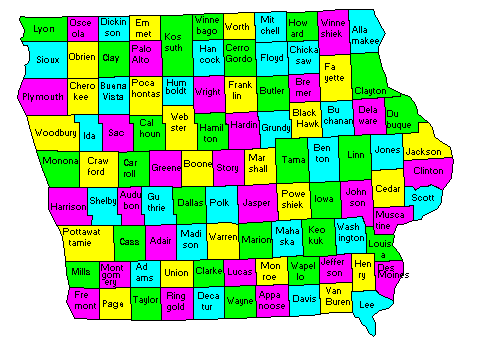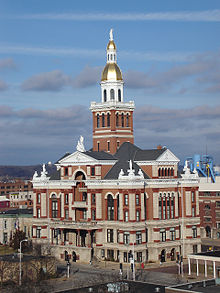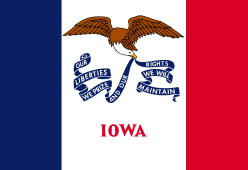|
Trails to the Past of Iowa
is accepting any donations of genealogy materials
that you may have such as marriage announcements,
news articles, old obituaries, births, (you do not
need the birth certificate) just the information,
and biographies. If you have any of these
items please contact me Marie
Miller the Iowa
State Administrator.
Dubuque
County is named for French trader Julien Dubuque,
the first European settler of Iowa, and an early
lead mining pioneer in what is now Dubuque County.
Dubuque was French Canadian, and had (by most
accounts) a friendly relationship with the local
Fox tribe of Native Americans. He and other early
pioneers established a lucrative mining and
trading industry in the area. When lead deposits
began becoming exhausted, the pioneers developed
boat building, lumber yards, milling, brewing, and
machinery manufacturing to take its place.
The
establishment of the City of Dubuque in 1833 led
to large-scale settlement of the surrounding area.
This was greatly encouraged by the Roman Catholic
Church, which sent priests, bishops, and nuns to
establish churches in the unpopulated countryside.
Primarily, Irish and German (many of whom were
Catholic) immigrants came to the region.
At an extra
session of the Sixth Legislative Assembly of
Michigan Territory held in September, 1834, the
Iowa District was divided into two counties by
running a line due west from the lower end of Rock
Island in the Mississippi River. The territory
north of this line (which started just south of
the present-day Davenport) was named Dubuque
County, and all south of it was Demoine County.
Thus, at that time Dubuque County nominally
included not only much of what is now the state of
Minnesota but portions of what are now North
Dakota and South Dakota.
Dubuque
County became part of Wisconsin Territory once it
was split off from Michigan Territory on July 3,
1836. A massive reorganization and reduction of
the county's size was executed on December 21,
1837, when its original area was separated into 13
named new counties and a "non-county area". The
land in present day Minnesota and the Dakotas was
transferred to the newly created Fayette County in
this action. Dubuque County became a part of Iowa
Territory upon its creation on July 4,
1838.
In 1858,
Saint Francis Catholic Church was established in
Dubuque County. It is one of Iowa's two original
counties along with Des Moines County; both were
organized by the Michigan Territorial legislature
in 1834.
The city of
Dubuque was chartered in 1833 as the first city in
Iowa.
|
On Line
Data |
|

| |
Cities
Asbury
Balltown
Bankston
Bernard
Cascade
Centralia
Dubuque
Durango
Dyersville
Epworth
Farley
Graf
Holy
Cross
Luxemburg
New
Vienna
Peosta
Rickardsville
Sageville
Sherrill
Worthington
Zwingle
Unincorporated
communities
Fillmore
Key
West
Washington Mills
Townships
Cascade
Center
Concord
Dodge
Dubuque
Iowa
Jefferson
Liberty
Mosalem
New
Wine
Peru
Prairie Creek
Table
Mound
Taylor
Vernon
Washington
Whitewater |


Dubuque County Court House
Adjacent
counties
Clayton
County (north)
Grant County, Wisconsin
(northeast)
Jo Daviess County, Illinois
(east)
Jackson County (southeast)
Jones
County (southwest)
Delaware County
(west) |
The information
on Trails to the Past © Copyright may be used in personal family history research, with source citation. The pages in entirety may not be duplicated for publication in any fashion without the permission of the owner. Commercial use of any material on this site is not permitted. Please respect the wishes of those who have contributed their time and efforts to make this free site possible.~Thank you! | 


